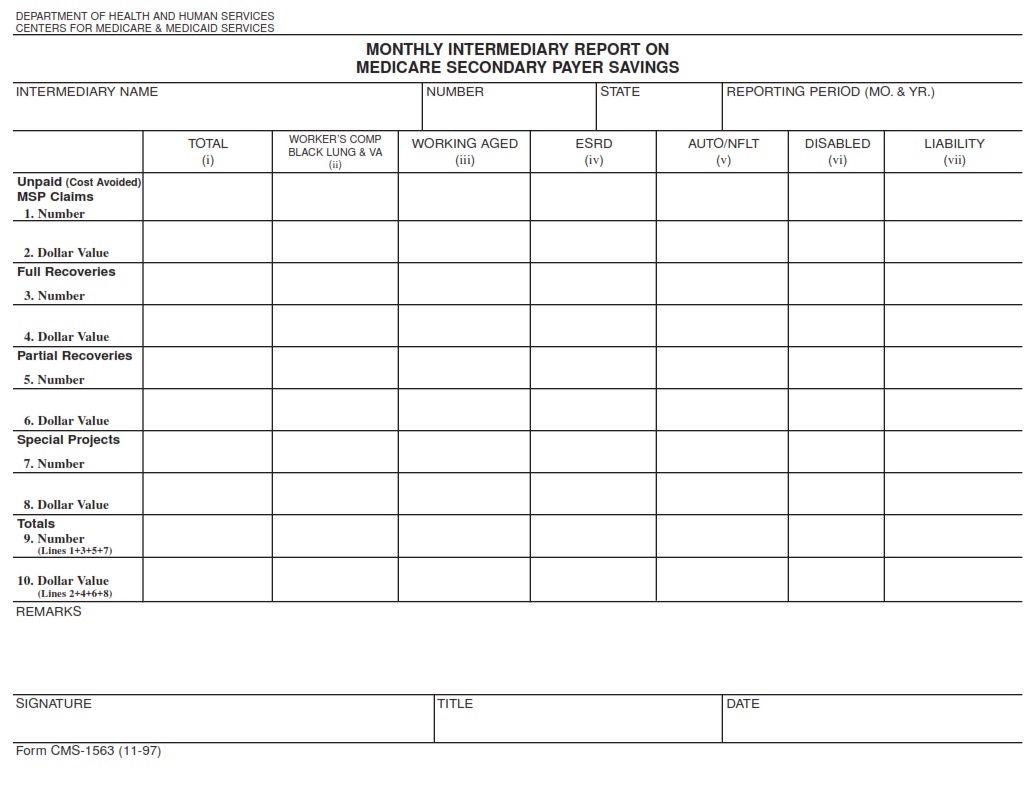CMSFORM.ORG – CMS 1563 – Monthly Intermediary Report on Medicare Secondary Payer Savings – In the intricate world of healthcare billing and insurance, the concept of Medicare Secondary Payer (MSP) savings plays a crucial role in ensuring fair and efficient reimbursement processes. At the heart of this system lies CMS 1563 – the Monthly Intermediary Report that meticulously tracks and analyzes these savings across various medical claims. Delving into the depths of this report unveils a fascinating tapestry of data, revealing insights into cost containment strategies, payment coordination intricacies, and the delicate balance between public and private healthcare coverage. Join us on a captivating journey through the labyrinthine corridors of MSP savings as we decode the significance of CMS 1563 in shaping the landscape of Medicare reimbursement policies.
Download CMS 1563 – Monthly Intermediary Report on Medicare Secondary Payer Savings
| Form Number | CMS 1563 |
| Form Title | Monthly Intermediary Report on Medicare Secondary Payer Savings |
| Published | 1997-11-01 |
| O.M.B. | – |
| File Size | 6 KB |
What is a CMS 1563?
CMS 1563, also known as the Monthly Intermediary Report on Medicare Secondary Payer Savings, plays a crucial role in tracking and reporting cost savings generated by Medicare. This form allows intermediary organizations to document and communicate their efforts in identifying primary payers responsible for covering healthcare costs before Medicare steps in. By diligently completing the CMS 1563 form each month, intermediaries contribute essential data that aids in maintaining the financial stability of the Medicare program.
Furthermore, this regulatory requirement fosters transparency and accountability within the healthcare system by ensuring that all stakeholders uphold their responsibilities towards medicare beneficiaries. The meticulous completion of CMS 1563 not only benefits individual organizations but also contributes to broader systemic improvements aimed at reducing healthcare costs and enhancing efficiency in care delivery. Ultimately, this report serves as a critical tool in promoting fiscal responsibility and safeguarding the sustainability of the Medicare program for future generations.
Where Can I Find a CMS 1563?
Finding a CMS 1563 form can be a critical step for healthcare providers and intermediary organizations looking to report Medicare secondary payer savings. While physical copies of the form can typically be obtained by reaching out to the Centers for Medicare & Medicaid Services or ordering them online, many organizations are opting for digital solutions. Online platforms like official CMS websites or electronic document management systems offer easy access to fillable versions of the CMS 1563 form, streamlining the reporting process.
Additionally, intermediaries often collaborate with technology providers specializing in healthcare compliance and reporting software to simplify their workflow. These specialized software solutions not only offer access to various Medicare forms including the CMS 1563 but also provide features such as data validation, automated submissions, and customizable templates. By leveraging these technological advancements, organizations can enhance efficiency, accuracy, and compliance when dealing with Medicare secondary payer savings reporting.
CMS 1563 – Monthly Intermediary Report on Medicare Secondary Payer Savings
The CMS 1563 Monthly Intermediary Report on Medicare Secondary Payer Savings plays a crucial role in ensuring the sustainability and efficiency of the Medicare program. By tracking and reporting on savings achieved through Medicare as a secondary payer, this report provides valuable insights into cost containment strategies and trends in healthcare reimbursement. Analyzing these reports can help identify areas for improvement and innovation in the ongoing efforts to reduce healthcare costs while maintaining quality care for beneficiaries.
Moreover, understanding the nuances of these monthly reports can empower healthcare organizations to optimize their billing practices, enhance compliance with Medicare regulations, and maximize cost savings opportunities. By leveraging the data from CMS 1563 reports effectively, stakeholders can proactively address challenges related to secondary payer obligations, streamline payment processes, and foster collaboration among insurers, providers, and government agencies. Ultimately, staying informed about the insights from these intermediary reports is essential for navigating the complex landscape of healthcare reimbursement and driving positive outcomes for both patients and payers alike.
